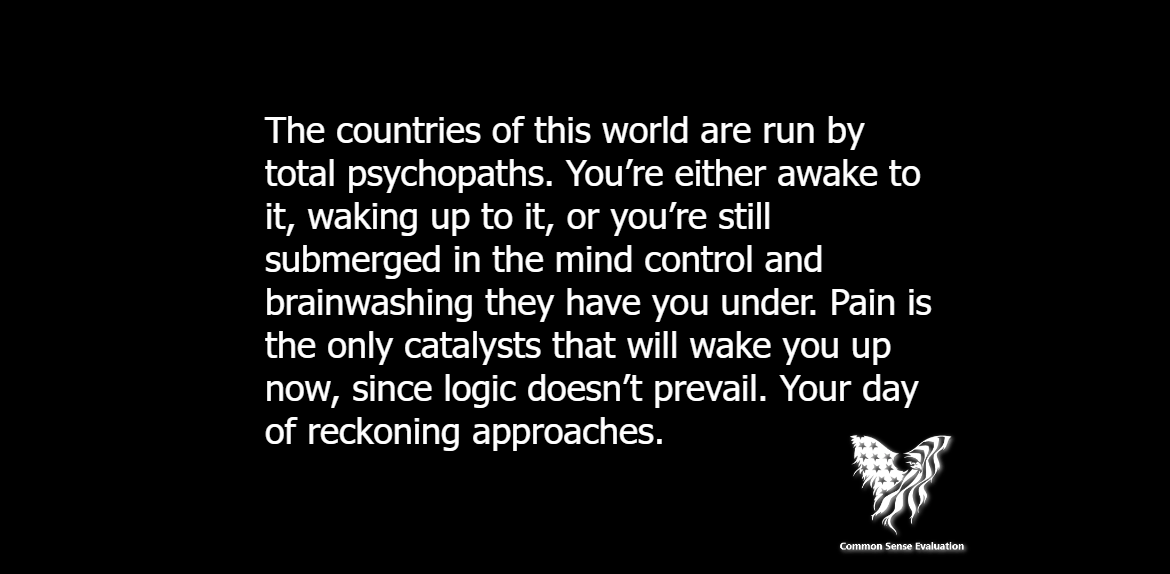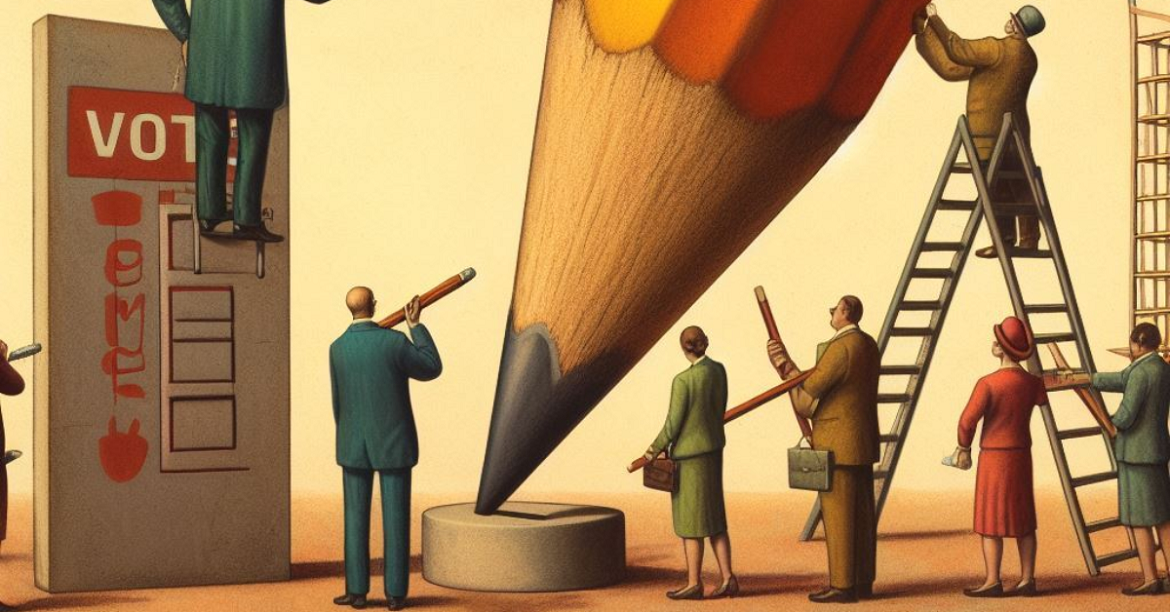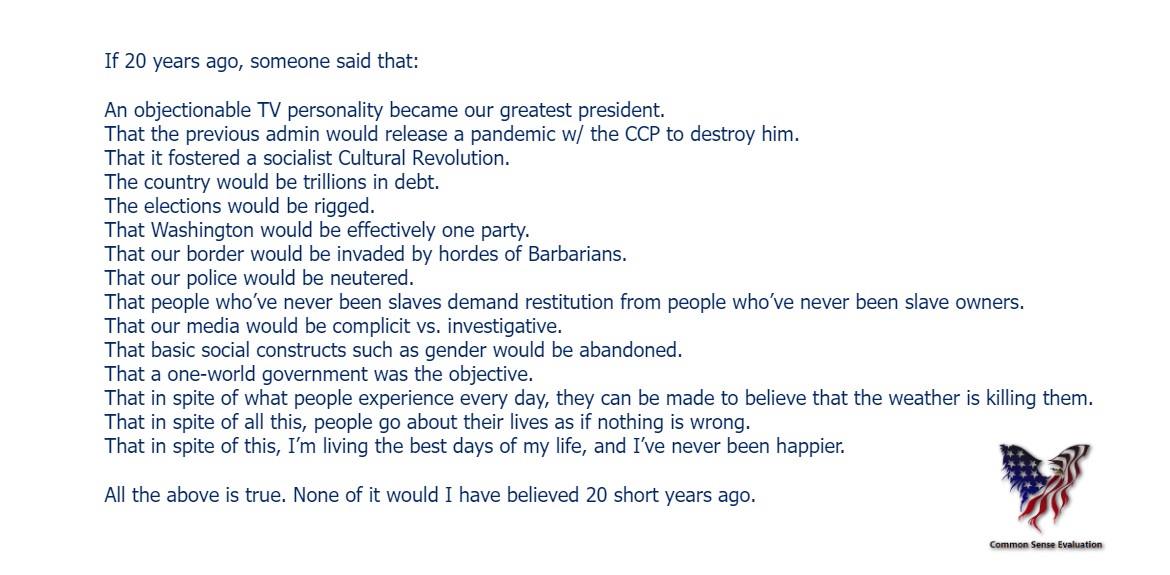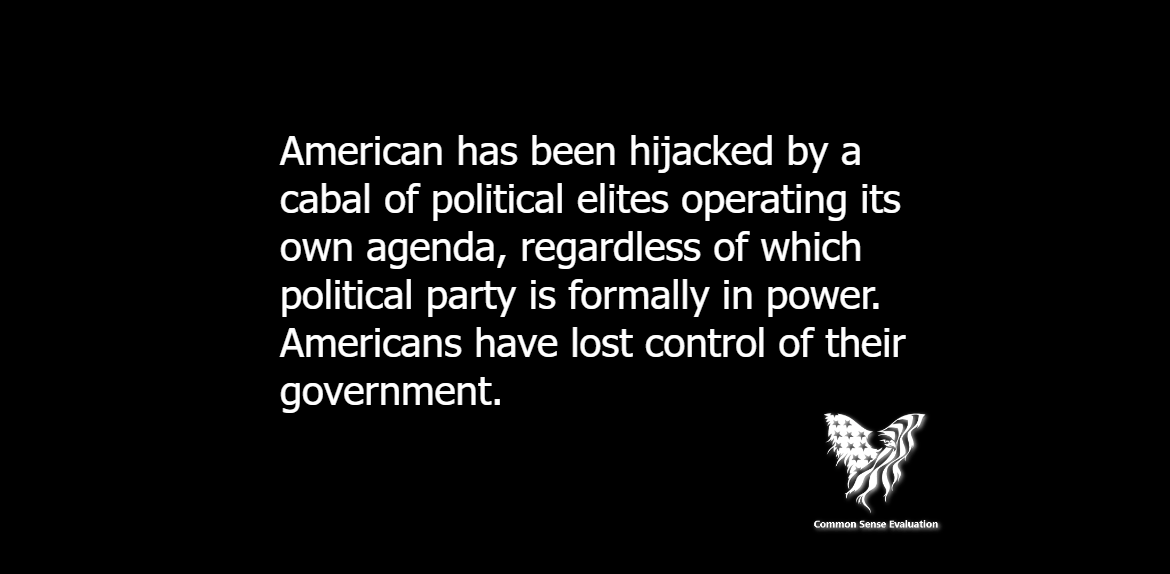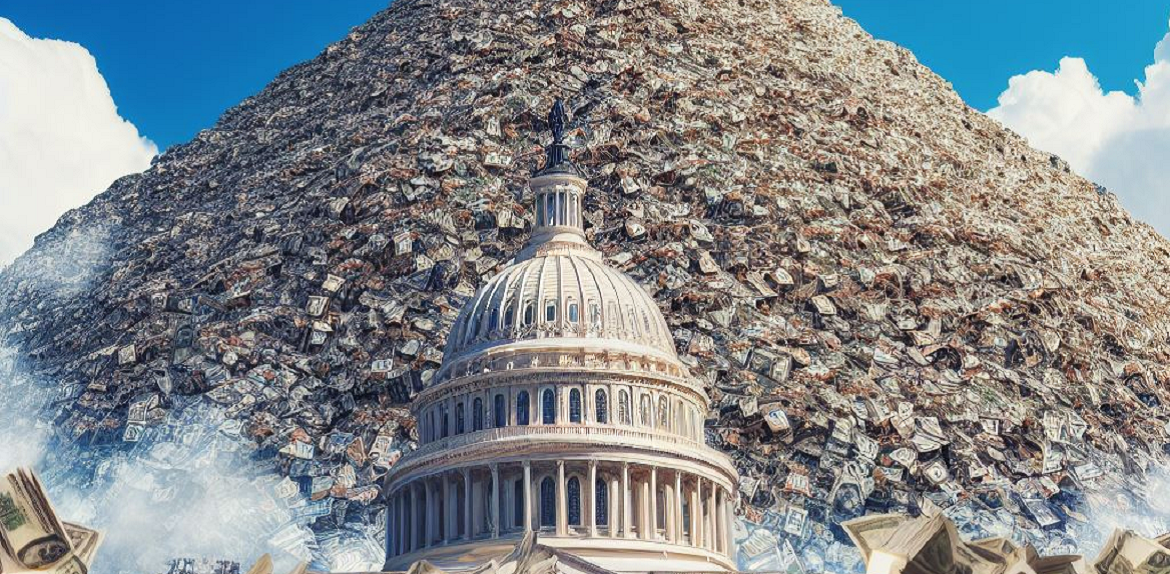The countries of this world are run by total psychopaths. You’re either awake to it, waking up to it, or you’re still submerged in the mind control and brainwashing they have you under. Pain is the only catalysts that will wake you up now, since logic doesn’t prevail. Your day of reckoning approaches.
Tag: Kevin McCarthy
The Hard Truth: Vote Harder Won’t Save Our Republic
In the heart of our great nation, a fervent debate continues to rage like an unrelenting storm. It’s the question of our times: Can we really vote our way out of stolen elections and the clutches of power-hungry politicians? The prevailing wisdom often dictates that we should “vote harder,” believing that our ballots alone can set things right. But let’s take a closer look beneath the surface, dissecting the intricacies of our republic and the manipulations that corrode it.
Corrupt Career Politicians
The crux of the problem lies in those we elect to represent us. In a world where power corrupts, career politicians regularly prioritize their interests over those of their constituents. It’s a tale as old as time: politicians clinging to power like a drowning sailor to a life preserver.
These career politicians have become masters of the art of staying in power. Gerrymandering, campaign financing loopholes, and a knack for exploiting the system have made them formidable opponents. But perhaps the most insidious weapon in their arsenal is the manipulation of mail-in ballots.
The Mail-In Ballot Conundrum
Mail-in ballots, once hailed as a convenient way to exercise our civic duty, have become a double-edged sword. On one hand, they offer accessibility and convenience for voters. On the other, they provide a fertile ground for manipulation.
Career politicians, driven by their insatiable hunger for power, have found ways to exploit this vulnerability. They argue that expanding mail-in voting is about accessibility and inclusivity. Still, in reality, it’s a tool that can be wielded to tip the scales in their favor.
The Perils of Mail-In Voting
The practice of mail-in voting is innately problematic, and the potential for abuse should give us pause. When politicians manipulate the process, it undermines the very foundation of our republic.
- Ballot Harvesting: One of the most concerning issues is “ballot harvesting.” This practice allows third parties to collect and submit absentee ballots on behalf of voters. While it can be a genuine service for some, it’s also a ripe opportunity for abuse. Unscrupulous individuals can coerce or manipulate vulnerable citizens, collecting their ballots and casting votes in their favor.
- Fraudulent Applications: Corrupt Politicians have also been known to flood the system with fraudulent mail-in ballot applications. This tactic can overwhelm election officials, making it easier for questionable ballots to slip through the cracks.
- Lack of Verification: The verification process for mail-in ballots is not foolproof. Voters’ identities can be difficult to confirm, leaving room for the casting of fraudulent votes.
The Illusion of “Vote Harder”
In the face of these challenges, the rallying cry of “vote harder” can seem like an exercise in futility. Casting more ballots won’t necessarily address the root issues of manipulation and corruption within the system.
When corrupt politicians are willing to bend the rules and exploit the vulnerabilities in our electoral process without repercussion, simply increasing voter turnout won’t guarantee a fair and just outcome. It’s akin to trying to put out a wildfire with a garden hose; you might make a dent, but the underlying inferno continues to rage.
A Multi-Pronged Approach
So, what can we do in the face of this complex web of manipulation and power-hungry politicians? While there is no one-size-fits-all solution, a multipronged approach can help safeguard our republic:
- Paper Ballots: Emphasize the use of paper ballots as a secure and transparent voting method to reduce the risk of electronic manipulation and ensure the integrity of our elections.
- Election Integrity Reform: Advocate for comprehensive election integrity reforms that address issues such as gerrymandering, campaign financing, and verification of paper ballots.
- Transparency: Demand transparency in the electoral process, including open access to the counting and verification of paper ballots, to ensure that every vote is legitimate.
- Civic Engagement: Encourage civic engagement beyond the ballot box. Stay informed, participate in local politics, and hold elected officials accountable for their actions.
- Education: Promote civic education to empower citizens with the knowledge they need to make informed decisions and spot potential manipulations.
- Legal Action: Support legal action to challenge election irregularities when they occur, ensuring that the rule of law prevails.
- Participation: Never underestimate the power of grassroots movements, community organizing, and peaceful protests to effect change.
With a strong emphasis on paper ballots, we fortify our electoral process, reducing vulnerabilities and enhancing the confidence of citizens in the integrity of our elections. Only through a holistic and vigilant approach can we truly navigate the maze and protect the principles upon which our nation was founded.
Closing Thoughts
As we traverse the treacherous waters of our republic, it’s imperative to acknowledge that the notion of “voting harder” is but a flickering candle in the gathering shadows. Our system, which is complicated and fragile, is still vulnerable to the evil plans of career politicians who want to keep their power.
In this murky landscape, safeguarding our republic demands more than the mere act of voting. It compels us to reckon with a somber reality: that our nation, once hailed as a beacon of hope, can be manipulated, twisted, and torn asunder by those who wield power without conscience.
To truly safeguard our republic now means navigating a perilous labyrinth, where the paths are obscured, and the dangers are manifold. It entails not only voting wisely but also vigilant scrutiny, unrelenting accountability, and the unwavering commitment to wrestle our country back from the shadows that engulf it.
In the end, it’s not just about voting; it’s about surviving the descent into darkness, preserving the fragile threads of justice and liberty, and confronting the abyss that looms ever larger on the horizon. Only then, against the backdrop of uncertainty and adversity, can we endeavor to protect the tattered remnants of the republic we once knew.
If 20 Years Ago
If 20 years ago, someone said that:
An objectionable TV personality became our greatest president.
That the previous admin would release a pandemic w/ the CCP to destroy him.
That it fostered a socialist Cultural Revolution.
The country would be trillions in debt.
The elections would be rigged.
That Washington would be effectively one party.
That our border would be invaded by hordes of Barbarians.
That our police would be neutered.
That people who’ve never been slaves demand restitution from people who’ve never been slave owners.
That our media would be complicit vs. investigative.
That basic social constructs such as gender would be abandoned.
That a one-world government was the objective.
That in spite of what people experience every day, they can be made to believe that the weather is killing them.
That in spite of all this, people go about their lives as if nothing is wrong.
That in spite of this, I’m living the best days of my life, and I’ve never been happier.
All the above is true. None of it would I have believed 20 short years ago.
America’s $33 Trillion Debt: How Interest Payments Threaten America’s Economy
Imagine a colossal mountain of money that stretches beyond your wildest imagination. Now, envision that this mammoth sum is not a treasure chest but a crushing burden, slowly sinking the world’s largest economy. What you’re picturing is the staggering debt of the United States. The interest payments on this colossal $33 trillion debt alone are shaking the nation’s financial stability. In this article, we will explore the intricacies of this crisis, exploring the potential consequences, and highlighting the importance of Congress taking responsibility for its spending habits.
The Burden of Debt
To truly understand the gravity of the situation, let’s break it down. The United States’ national debt stands at an astonishing $33 trillion, a figure surpassing the combined GDP of most countries on Earth. To put it in perspective, if you counted one dollar per second, it would take you over a million years to reach that astronomical amount. However, it’s not just the sheer size of the debt that’s alarming; it’s the interest payments that are draining America’s financial vitality.
Interest Payments: The Silent Killer
Interest payments on the national debt may seem like a necessary evil, but their magnitude is nothing short of jaw-dropping. In recent years, these payments have been skyrocketing, consuming an ever-growing share of the federal budget. But how does this work, you ask? The U.S. government borrows money by issuing Treasury bonds and pays interest on this borrowed cash. The more debt the government accumulates, the higher the interest payments become.
Presently, the U.S. government allocates a substantial portion of its annual budget to service this debt, which leaves less money available for essential programs like education, healthcare, and infrastructure. It’s akin to having a credit card bill so enormous that it consumes your entire paycheck, leaving you with little to cover your essential expenses.
The Vicious Cycle
The problem doesn’t end there. As interest payments balloon, they create a vicious cycle. To pay the interest, the government often borrows even more money, adding to the debt pile. This cycle perpetuates itself, with interest payments growing exponentially over time. It’s a financial treadmill that’s increasingly challenging to step off.
What’s at Stake?
So, why should you care about these interest payments? Well, they have far-reaching consequences that could affect every American. Here are some of the key areas where the repercussions could be felt:
- Higher Taxes: To cover interest payments, the government might have to raise taxes, leaving citizens with less money in their pockets.
- Reduced Public Services: As more money goes towards interest, there’s less available for essential services, potentially leading to deteriorating infrastructure, lower-quality healthcare, and underfunded schools.
- Economic Uncertainty: An unsustainable debt burden can lead to economic instability, impacting job security, investment, and overall prosperity.
- Generational Inequity: Future generations will be saddled with the consequences of today’s fiscal decisions, potentially limiting their opportunities and quality of life.
The Role of Congress
While we discuss the looming crisis of interest payments, it’s crucial to recognize the significant role that Congress plays in this situation. The debt and the subsequent interest payments are not solely the result of economic forces; they are also the direct consequence of congressional spending decisions. Congress controls the purse strings, and it is responsible for approving budgets and authorizing government expenditures.
Congress’s Spending Habits
It is impossible to deny that Congress’s spending habits have contributed significantly to the ballooning national debt. Irresponsible spending, unchecked growth in government programs, and a tendency to kick the can down the road when it comes to addressing fiscal issues have all played a part. It’s time for Congress to take responsibility for its role in this financial predicament.
The Road Ahead
While the situation may seem dire, it’s not all doom and gloom. There are steps that can be taken to address this crisis, and Congress must lead the way:
- Fiscal Responsibility: Congress must exercise fiscal responsibility by curbing excessive spending, adopting a more disciplined approach to budgeting, and finding ways to reduce the deficit.
- Economic Growth: A robust economy generates more revenue, making it easier to manage the debt. Congress should prioritize policies that promote economic growth.
- Debt Restructuring: Exploring options like debt restructuring or refinancing to lower interest rates can help ease the burden of interest payments.
- Reducing the Debt: Congress must take concrete steps to reduce the national debt through a combination of spending cuts and revenue increases.
- Accountability and Transparency: Congress should be more transparent about how taxpayer money is being spent and be held accountable for its fiscal decisions.
Final Thoughts
The looming crisis of interest payments on America’s $33 trillion debt is a matter that affects us all. It’s not an issue confined to economists and policymakers; it’s a pressing concern that will shape the future of our nation. As American citizens, it’s crucial to stay informed about the state of our economy and advocate for responsible fiscal policies. Congress must recognize its role in this financial challenge and take meaningful steps to address it. The path forward may be challenging, but with informed citizens and responsible decision-making, we can work towards a more financially secure future for all Americans. The time for Congress to act responsibly is now, before the interest payments on this colossal debt truly bankrupt America.
